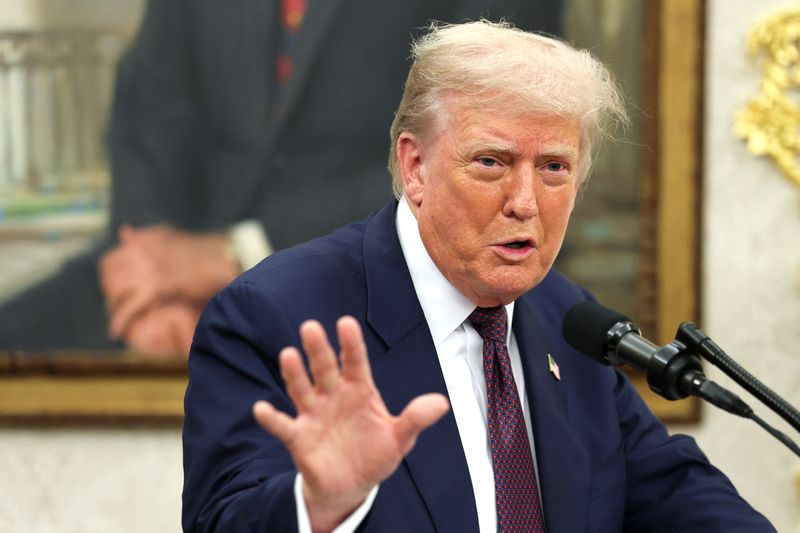By Andrea Shalal
WASHINGTON (Reuters) -At a glance, U.S. President Donald Trump appears to be winning the trade war he unleashed after returning to the White House in January, bending major trading partners to his will, imposing double-digit tariff rates on nearly all imports, narrowing the trade deficit, and raking in tens of billions of dollars a month in much-needed cash for federal government coffers.
Significant hurdles remain, however, including whether U.S. trading partners will make good on investment and goods-purchase commitments, how much tariffs will drive up inflation or stymie demand and growth, and whether the courts allow many of his ad-hoc levies to stand.
On inauguration day, the effective U.S. tariff rate was about 2.5%. It has since jumped to somewhere between 17% and 19%, according to a range of estimates. The Atlantic Council estimates it will edge closer to 20%, the highest in a century, with higher duties taking effect on Thursday.
Trading partners have largely refrained from retaliatory tariffs, sparing the global economy from a more painful tit-for-tat trade war. Data on Tuesday showed a 16% narrowing of the U.S. trade deficit in June, while the U.S. trade gap with China shrank to its smallest in more than 21 years.
American consumers have shown themselves to be more resilient than expected, but some recent data indicate the tariffs are already affecting jobs, growth and inflation.
“The question is, what does winning mean?” said Josh Lipsky, who heads economic studies at the Atlantic Council. “He’s raising tariffs on the rest of the world and avoiding a retaliatory trade war far easier than even he anticipated, but the bigger question is what effect does that have on the U.S. economy.”
Michael Strain, head of economic policy studies at the conservative American Enterprise Institute, said Trump’s geopolitical victories could prove hollow.
“In a geopolitical sense, Trump’s obviously getting tons of concessions from other countries, but in an economic sense, he’s not winning the trade war,” he said. “What we’re seeing is that he is more willing to inflict economic harm on Americans than other countries are willing to inflict on their nations. And I think of that as losing.”
Kelly Ann Shaw, a White House trade adviser during Trump’s first term who is now a partner at Akin Gump Strauss Hauer & Feld, said a still-strong economy and near-record-high stock prices “support a more aggressive tariff strategy.”
But Trump’s tariffs, tax cuts, deregulation and policies to boost energy production would take time to play out.
Story Continues
